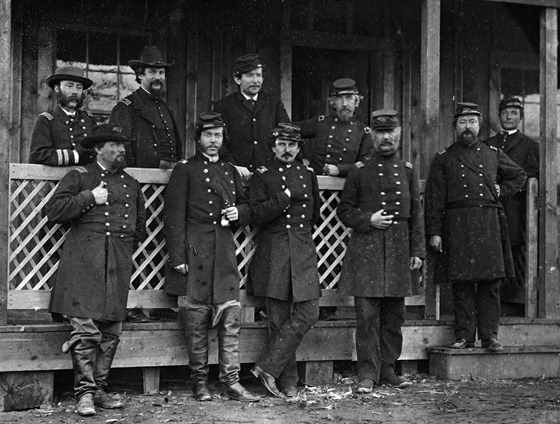February 8th, 1863.
We are under marching orders again—ready to move at a minute’s notice. The Ninth Army Corps is detached from the Army of the Potomac and is ordered to report to General Dix, at Fortress Monroe. The supposition is we go on an expedition somewhere —rumor says Vicksburg. The first detachment has gone, and we are awaiting the return of the transports. The men are well pleased with the idea of going farther south. For myself, I say any place but this. When we came here the country was a wilderness, covered with a heavy growth of scrub pine. Now it is a desert with scarcely a tree, and not a fence rail for miles in any direction.
It seems that Richmond has lost its strategic importance, and the “decisive blow” which was to have fallen there has been transferred to five other points, viz: Vicksburg, Port Hudson, Rosa’s and Foster’s expeditions, and Charleston. “If these prove successful,” say the Washington papers, “the rebellion will end in thirty days.” God grant them all success.. When I survey the past history of the war I can see but little in the immediate future to encourage hope. The conviction is forced upon me that if the North subdue the South, the war has but just begun. It can and will be done, but time and persevering effort only will accomplish it. The people are too impatient. They demand important victories now, while some fortified place—Vicksburg, for instance—can only be taken by siege, and siege means weeks and months of waiting.
Government, urged on by the people, acts as if the salvation of the country depends on all this being accomplished before the fourth of March. But I see nothing but failure in haste.

Aquia Creek, Virginia. Group standing in front of hospital, photographed by by Alexander Gardner.
Library of Congress image.
FEBRUARY 8TH.—From intelligence received yesterday evening, it is probable the Alabama, Harriet Lane, and Florida have met off the West Indies, and turned upon the U.S. steamer Brooklyn. The account says a large steamer was seen on fire, and three others were delivering broadsides into her. The United States press thought the burning steamer was the Florida.
From Charleston or Savannah we shall soon have stirring news. They may overpower our forces, but our power there will be completely exhausted before resistance ceases. There will be no more “giving up,” as with New Orleans, Norfolk, etc. Yet there is a feverish anxiety regarding Vicksburg. Pemberton permitted one iron-clad gun-boat to pass, and all our boats below are now at its mercy.
The House of Representatives, at Washington, has passed the “negro soldier bill.” This will prove a “Pandora’s Box,” and the Federals may rue the day that such a measure was adopted.
February 8.—Colonel W. R. Penick, from his headquarters at Independence, Mo., sent a detachment of fifty men from the Fifth cavalry of Missouri volunteers, under the command of Lieutenant D. A. Colvin, in pursuit of a guerrilla camp, which he ascertained existed in the vicinity. His scout came up with the enemy at two o’clock this afternoon, when a running fight commenced, which lasted about thirty minutes, and resulted in the rout of the guerrillas, with eight killed, two wounded, and all their arms captured. To test the fighting qualities of the negro, Colonel Penick sent a contraband with the party at his own request. The negro was severely wounded in the shoulder, but expressed “his willingness to again fight the bushwhackers as soon as he should recover.”—Colonel Penick’s Report.
—The expedition under Generals Davis and Morgan, sent from Nashville, Tenn., in pursuit of Forrest and Wheeler’s rebel force, who were retreating to the West, returned this evening. Seven miles east of Charlotte, thirty rebel prisoners were captured, among whom were Colonel Carroll, and Major Rembrant, of Forrest’s staff.— Lebanon, Tenn., was entered and occupied by the National forces, who succeeded in capturing six hundred rebels, most of them belonging to the command of General Morgan.—The work of cutting the canal at Vicksburgh continued rapidly, a large force being engaged upon it night and day.—Rear-Admiral Porter reported the capture of three rebel transport steamers on the Red River, Ark., by the Queen of the West, under the command of Colonel Ellet.—The circulation of the Chicago Times newspaper was prohibited in the command of General Hurlbut, by a general order issued at Memphis, Tenn.





